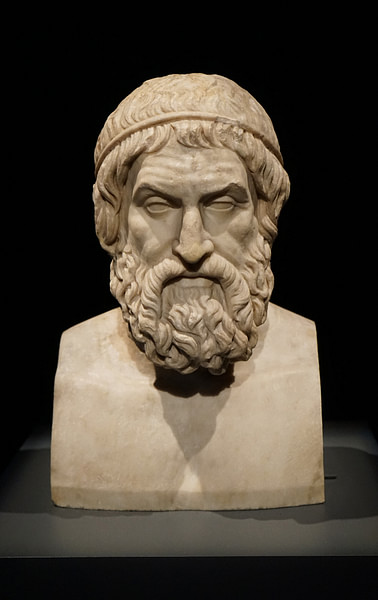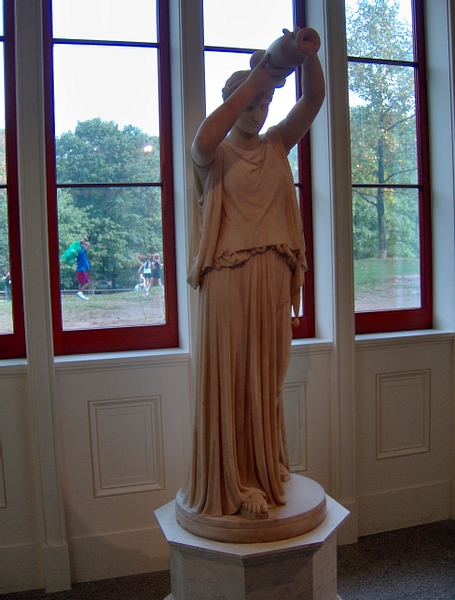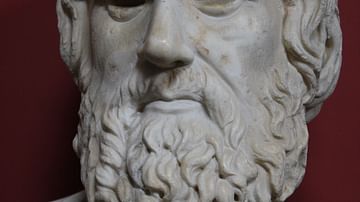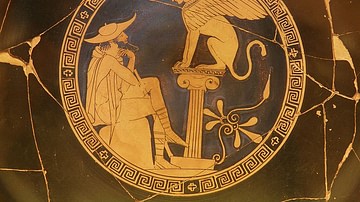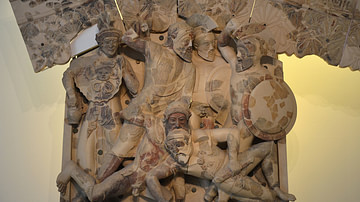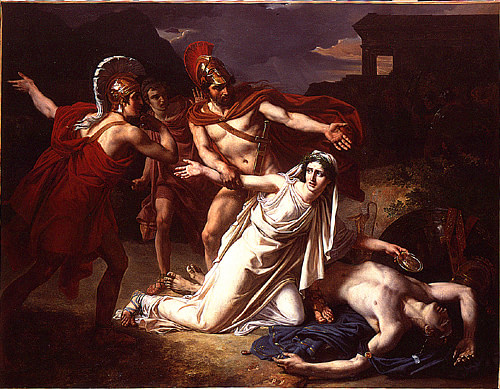
Antigone was the third play in the Oedipus trilogy written by the great Greek playwright Sophocles (c. 496 - c. 406 BCE). Produced around 441 BCE and receiving first prize at the Dionysia festival, the tragedy was actually written long before both Oedipus the King and Oedipus at Colonus. In the play, Antigone returns to Thebes after the death of her father Oedipus. Her brothers Polynices and Eteocles have both been killed in the war between Argos and Thebes. Creon, Antigone's uncle, has assumed the leadership of Thebes and by decree refuses to grant the traitor Polynices a proper burial. Antigone chooses to disobey Creon and bury her brother herself. Having violated Creon's order, she is imprisoned and left to die, eventually hanging herself. Haemon, her fiancé and Creon's son, joins her, taking his own life. Finally persuaded by a prophet to change his mind, Creon is too late to save either his son or Antigone. His wife Eurydice commits suicide, blaming Creon for the death of her son. In the end, Creon is left alone.
Sophocles
Sophocles was born around 496/5 BCE to a wealthy family from Colonus, a deme near the heart of Athens. Unlike many of his fellow playwrights, he was active in Athenian politics, serving as a treasurer and a general in 441-440 BCE with the statesman Pericles. Later, he became a member of a select group of magistrates given the task of reorganizing finances and domestic affairs after the disastrous defeat of Athens at Syracuse (412-411 BCE). He had two sons; Iophon by his wife Nicostrate, and Ariston by his mistress Theoris, whose son Sophocles the Younger also became a minor playwright, like his uncle Iophon. Writing almost to the day he died, his final play of the Theban trilogy, Oedipus at Colonus, was presented in competition by Iophon in 401 BCE. Sophocles received eighteen victories in competition at Dionysia, more than both Aeschylus and Euripides. Although active in Athenian political circles, his plays rarely contain any references to contemporary events or issues, making the dating of his plays difficult. Unfortunately, of his over 120 plays, only seven have survived.
According to Edith Hamilton in her book The Greek Way, by the time of Sophocles, the “stream of life” (196) that had existed a few short years earlier during the time of Aeschylus was long gone. Athens was in decline. Hamilton believed Sophocles viewed life as being hard. The always conservative playwright - even in the matters of religion - still believed in his beloved city and its laws, always upholding the established order. To Hamilton, he embodied everything we know to be Greek. He was “direct, lucid, simple and reasonable” (199).
The Myth & Characters
Like many of the plays based on Greek myths, the audience was familiar with both the legend and its characters. In Antigone, an understanding of the story leading to her return to Thebes is essential. Long before Antigone left Oedipus and returned to her home in Thebes, her two brothers, Eteocles and Polynices, had been at war. The two quarreled over the leadership of the city. After a long and heated debate, they finally agreed to serve alternate one-year reigns; however, at the end of Eteocles's first year, he refused to surrender the throne. Enraged, Polynices left Thebes and became an exile. Now living as an outcast, similar to his father Oedipus, he allied himself with the king of Argos and waged war against Thebes; this war is the subject of Aeschylus' play Seven against Thebes.
As the conflict progressed and casualties began to mount, it became apparent that the war was a stalemate. The solution was simple: the brothers would engage in a one-on-one combat. Unfortunately, the outcome was the unforeseen death of both brothers. Seizing the opportunity, Creon, the brothers' uncle, assumed the throne and decreed that only Eteocles body would be buried and given the proper rites; Polynices' body would be left exposed to the elements. This is where Sophocles' Antigone begins.
There are relatively few characters in the play:
- Antigone
- Ismene
- Creon
- Haemon
- the prophet Teiresias
- Creon's wife Eurydice
- two messengers
- a guard
- and, of course, the chorus.
The Plot
The opening scene is at the royal palace of Thebes. Antigone and her sister Ismene stand outside the palace doors. They have both just learned of Creon's edict concerning their brothers. Antigone turns to her sister:
Creon will give the one of our two brothers honor in the tomb: the other none. Eteocles, with just observance treated, as law provides he has hidden under earth to have full honor with the dead below. (Grene, 22)
Polynices, being viewed as a traitor, will not receive a proper burial; a violation of religious tradition. Creon proclaimed that no one may bury him, leaving him “unwept, untombed, a rich sweet sight for the hungry birds' beholding and devouring” (22). While Ismene seems obviously upset, she responds that they are women and there is nothing they can do. However, Antigone has already devised a plan and asks her sister to join her and share in her labor. Fearing they will be punished for breaking the law, Ismene attempts to talk some sense into Antigone, but she refuses. Antigone exits: “Now I go to heap the burial mound for my dearest brother” (24).
Creon appears before the palace and addresses the chorus, asserting his authority as king:
When they two perished by a double fate, on one day struck and defiled each by each other's hand, now it comes that I hold all the power and the royal throne through close connection with the perished men. (27)
He declares that Eteocles who died defending Thebes will be granted holy rites, but Polynices who brought harm to Thebes shall not, leaving his body disgraced. Anyone who violates this edict will die. A guard arrives with troubling news:
Someone left the corpse just now, burial is all accomplished, thirsty dust strewn on the flesh, the ritual complete. (30)
Creon is incensed and orders the culprit to be found. He threatens the guard. The guard exits but quickly returns with Antigone. Creon faces her as the guard explains how she was caught. Antigone quietly listens and finally says, “I say I did it and I don't deny it” (37). Defiantly, she states that she understood the edict but still chose to challenge Creon's order as it did not come from Zeus. She could not leave her brother unburied. She completely realizes that she must die and will not grieve for she has buried her mother's son:
… what greater glory could I find than giving my own brother's funeral? (39)
In defense of his actions, Creon claims that no one else in Thebes sees it as she does, but Antigone quickly dismisses this; there are others who share in her belief, but Creon has everyone cowering. Despite the king's challenges, she refuses to submit or regret her actions. When Creon asserts that her brother was a criminal, she responds, “It was my brother, not a slave, who died” (40). With no regrets, she will accept her fate. Unmoved, Creon discloses that he is charging Ismene as well, for she shared in the planning of the burial. Ismene is brought before him under guard and stands next to her sister. Antigone pleads with her younger sister, “My death's enough” (41). However, Ismene tells Creon that her life is nothing without her sister and reminds Creon that if Antigone dies, he is taking his son's bride from him. The sisters are led away.
Haemon appears and confronts his father. Creon asks if his son has heard the vote that condemned his bride. In an attempt to persuade his father, Haemon reassures him that he still loves him; however, the city of Thebes is grieving for Antigone because she would not leave her brother unburied. Creon dismisses this and claims that his son's mind is poisoned; he should not let lust mislead his mind. Creon defends his actions and tells Haemon that obedience is essential to keep a city secure, so he must protect those who yield to order. He adds that he refuses to be beaten by a woman. Unshaken, Haemon vows that if she dies, her death will bring another. Before leaving he says, “If you weren't father, I should call you mad” (49).
After Haemon leaves, Creon announces that he is releasing Ismene, but Antigone is to be taken to a hollow cave and left to die. He departs as Antigone enters and addresses the chorus:
My last night of the sun, then never again. Death who beings all to sleep takes me alive to the shore of the river underground. Not for me was the marriage hymn, not will anyone start the song at a wedding of mine. Acheron is my bridegroom. (51)
Creon returns and orders her to be taken away. As she exits, the old blind prophet Teiresias arrives assisted by a young attendant. He tells Creon he must heed the signs. He pleads with Creon to rescind his order; all men make mistakes. As with the pleadings of his son, Creon is unmoved and reminds the old seer that he is speaking to the king. Teiresias responds:
You settled a living person without honor in a tomb; you keep up here that which belongs below; a corpse unburied and unholy. Not you, nor any god on high should have any business with this. The violation's yours. [...] men and women shall wail within your house and all the cities you fought in war … will all move against you. (60)
The old seer is escorted off by his attendant. Creon addresses the chorus and asks for their guidance. The chorus leader agrees with the old seer and advises the king to bury the dead properly and release Antigone. Creon finally submits and exits. A messenger soon enters and addresses the chorus. Both Antigone and Haemon are dead. As the messenger speaks to the chorus, Eurydice, Creon's wife appears from inside the palace and is told that her only surviving son's death. The messenger relates how they had given Polynices a proper burial and gone to release Antigone; however, when they arrived she had already hanged herself. Creon begged Haemon to return to the palace. Haemon refused, spat in his father's face and leaned on the blade of his sword. As he died, he embraced Antigone. “He found his marriage, in celebration in the halls of Hades.” (65)
Creon returns to the palace carrying Haemon's body. The messenger tells him of his wife's death, self-inflicted. Before she died, she cursed him as the killer of her children. To the messenger and chorus, Creon says, "I was dead, and you killed me again" (67). Creon prays for death:
Will no one strike and kill me with cutting sword? [...] My life is warped past cure. Fate unbearable has leapt down on my head. (68-69)
Conclusion
In some ways, the play is more about Creon than Antigone. According to Paul Roche in his book The Oedipus Plays of Sophocles, Oedipus and Creon both display the glory and weakness of a self-sufficient man. Creon initially did what he believed to be right; however, his vanity and unwillingness to listen to the advice of those around him eventually brought the downfall of his entire family. He is left standing alone before his palace, praying for the gods to take him.
Moses Hadas in his book Greek Drama said it is easy to praise Antigone as a saint and condemn Creon as a tyrant. However, Creon was right by not honoring the traitor Polynices with the proper burial rights; he was an enemy of the state. On the other hand, Antigone was in the wrong for openly disobeying an order of the king. Although Creon may have displayed a devotion to duty, Hadas believes the play is justly named for Antigone because she sacrificed her life and love for an ideal. However one may perceive Antigone, the play would continue to be performed. Authors would follow in Sophocles' footsteps and write about her, although often with a different ending; Euripides' lost play had her survive, marry Haemon and have children. Even poets such as Shelley and Goethe would write about her. Today many look to her as martyr and symbol of a person fighting for an ideal.

